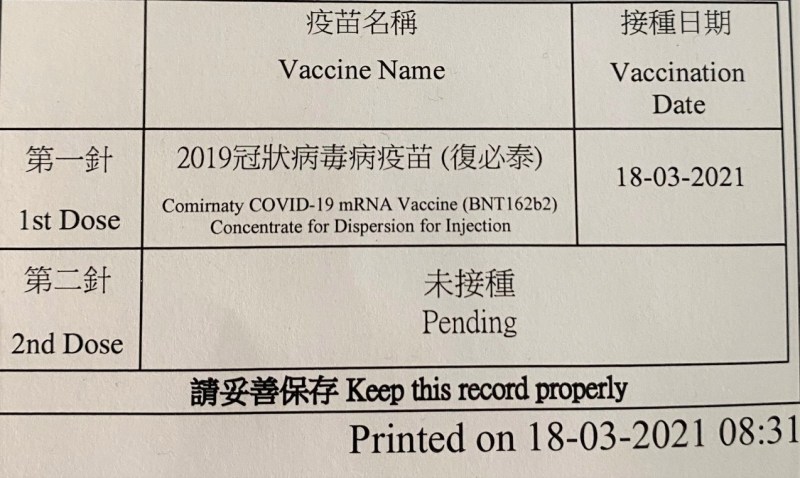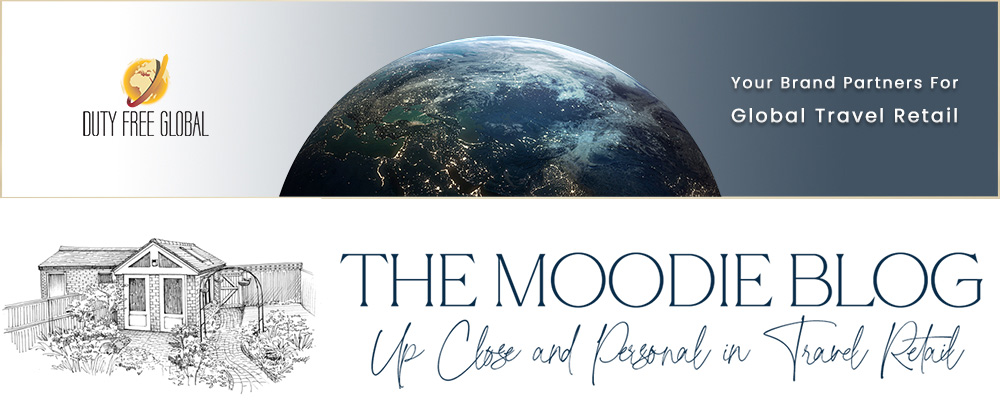Latest posts by Martin Moodie (see all)
- How I overcame Severe Tire Damage to become the oldest influencer in town - April 20, 2024
- Free as a (Kiwi) bird and flying high in Haikou - April 13, 2024
- Discovering Food Accademia’s world of fine flavours at a Hong Kong cha chaan teng - April 6, 2024
Last week I wrote joyfully about having had my first shot of the Pfizer-BioNTech vaccine here in Hong Kong, and looked forward to completing the routine with the follow-up jab on 8 April.
Alas, that might not now happen – at least not anytime soon – following yesterday’s news that the Hong Kong government has suspended the use of the Pfizer-BioNTech vaccine due to faulty packaging in one batch. According to my compulsory daily reading, the South China Morning Post, over 50 defects in the packaging, including cracks, leaks, and stains on the outside of glass vials, were reported by frontline staff.

While officials have emphasised that the manufacturer had found nothing to indicate the products presented a safety risk, that’s not much reassurance to those who have had their round-one jabs and very frustrating to those who were about to.
Two days ago I was excitedly planning a trip back to the UK to see my kids and my lovely granddaughter Carys, now nearly nine months of age, whom I last saw when she was ten days old. Now, as with so many others around the globe, my plans are – unlike me – up in the air. It sucks but to stay with that not particularly attractive verb, one just has to suck it up.

No shot in the arm, however, is at least painless. Not so a stab in the heart. That was the metaphor used by Gebr Heinemann CEO Max Heinemann in a LinkedIn post this week that lashed out at the impact of tightened travel restrictions on the family-held business and the travel sector in general.

This outstanding company, one that has survived numerous crises including two world wars over the past 142 years, currently has 53% of its nearly 400 airport shops worldwide closed.
A whole canister of salt was poured onto that gaping wound as the German government this week extended several lockdown measures until 18 April in a bid to slow the rate of infection – one requirement being that all air travellers must produce a negative COVID-19 test before flying to Germany, regardless of where they travel from. The government has also appealed to all citizens to refrain from non-essential travel within the country and abroad.

Noting that his business has shed 32% of its global workforce due to the crisis, Max Heinemann said: “The federal state decision with no recognisable opening perspective and instead with a de facto travel ban is a bitter setback for the entire travel industry. The continuation of the tourist lockdown and the continued negative positioning of travel by politics is disproportionate and once again increases the existential fears of companies throughout the travel industry.
“We have already had to say goodbye to a third of our employees worldwide – a stab in the heart for our family business. It cannot be that the questionable management of the German government in matters of vaccination is carried out solely at the expense of companies and their employees.”
A stab in the heart. Painful to say, painful to feel. Many of us understand that sentiment. Our own statistic (including those on furlough) runs at over 50%. As a family company that neither feels comfortable nor right but we have no choice if we are to survive. Besides the impact on those who have lost their roles, such depleted resources places at times near intolerable strain on those that remain (I speak from painful experience being both ‘factory’ owner and head factory worker).
Like many, I’m watching carefully to see what UK Prime Minister Boris Johnson says about the government’s global travel taskforce’s findings. Those findings were expected to be announced on 12 April but the date looks likely to be pulled forward to 5 April. The government has already declared 17 May as the earliest possible day for foreign holidays (attempting to travel abroad before then – “without a reasonable excuse” – will result in a £5,000 fine under new coronavirus laws).
What the UK recommends matters on a wider scale. The country holds the Presidency of the G7 and is hosting the intergovernmental organisation’s 47th G7 Summit on 11–13 June. The proper, regulated and well-manged revival of international travel must be high on the agenda.
The group comprises Canada, France, Germany, Italy, Japan, the UK and US. That’s over 46% of global GDP right there (by nominal values and more than 32% in terms of purchasing power parity). The seven will be joined as usual by the European Union. How much of that global wealth does the travel & tourism sector contribute? Answer, a very large chunk. According to Statista, in terms of total contribution (i.e. including indirect and induced impact) the answer is 10.4%.
It’s a statistic that stops you in its tracks. I can make do awhile yet without another shot in the arm. But the stabbing in the heart must stop.


